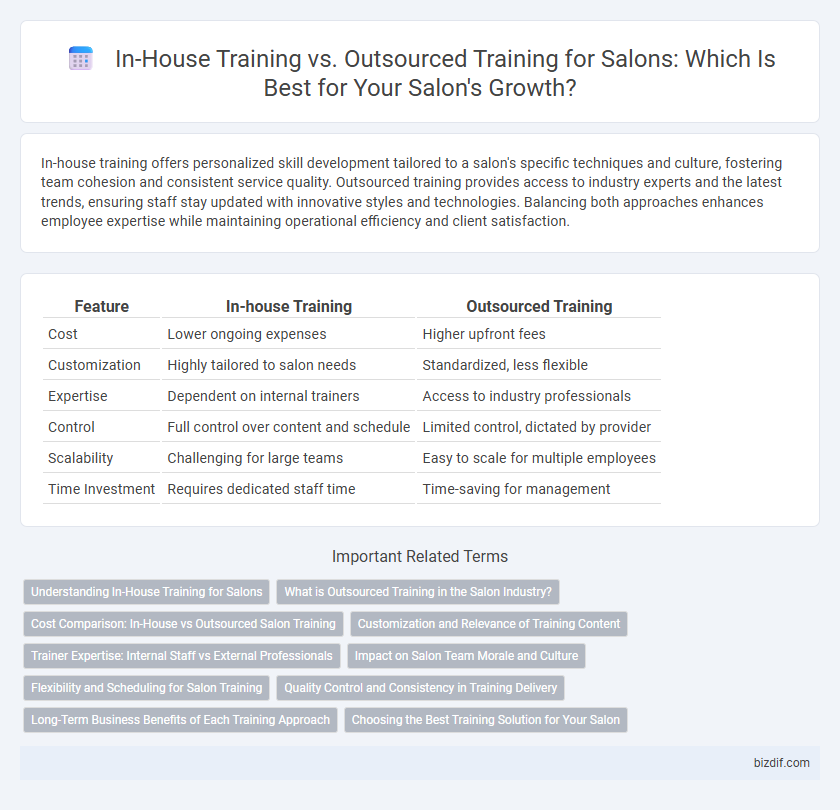In-house training offers personalized skill development tailored to a salon's specific techniques and culture, fostering team cohesion and consistent service quality. Outsourced training provides access to industry experts and the latest trends, ensuring staff stay updated with innovative styles and technologies. Balancing both approaches enhances employee expertise while maintaining operational efficiency and client satisfaction.
Table of Comparison
| Feature | In-house Training | Outsourced Training |
|---|---|---|
| Cost | Lower ongoing expenses | Higher upfront fees |
| Customization | Highly tailored to salon needs | Standardized, less flexible |
| Expertise | Dependent on internal trainers | Access to industry professionals |
| Control | Full control over content and schedule | Limited control, dictated by provider |
| Scalability | Challenging for large teams | Easy to scale for multiple employees |
| Time Investment | Requires dedicated staff time | Time-saving for management |
Understanding In-House Training for Salons
In-house training for salons involves skill development programs conducted within the salon environment, allowing staff to learn hands-on techniques tailored to the salon's specific services and culture. This approach enhances team cohesion, ensures consistent service quality, and allows immediate application of new skills such as advanced coloring, cutting, and customer service protocols. Investing in in-house training helps salons maintain a competitive edge by customizing education to meet unique client needs and boosting overall employee performance and satisfaction.
What is Outsourced Training in the Salon Industry?
Outsourced training in the salon industry involves hiring external experts or professional training organizations to provide specialized education and skill development for salon staff. This approach brings cutting-edge techniques, industry trends, and certification opportunities that may be unavailable through in-house programs. Utilizing outsourced training can enhance staff expertise, improve client satisfaction, and boost a salon's competitive edge in the beauty market.
Cost Comparison: In-House vs Outsourced Salon Training
In-house salon training typically incurs fixed costs such as trainer salaries, training materials, and dedicated space, which may require significant upfront investment but offer long-term savings and customization. Outsourced salon training often involves variable costs based on session frequency and participant numbers, with added benefits of expert-led, up-to-date techniques that reduce internal resource strain. Analyzing cost-effectiveness depends on salon size, training frequency, and desired skill level, making tailored in-house programs economical for large teams, while small salons may benefit from outsourced flexibility and expertise.
Customization and Relevance of Training Content
In-house training offers salons highly customized programs tailored to specific brand values, service techniques, and client demographics, ensuring relevance to daily operations. Outsourced training programs may provide broad industry knowledge but often lack the ability to address unique salon culture and specialized skill sets. Custom content development in in-house training enhances employee engagement and improves the effectiveness of learning outcomes by directly targeting salon-specific challenges.
Trainer Expertise: Internal Staff vs External Professionals
In-house training leverages the deep salon-specific knowledge and culture of internal staff, offering tailored skill development aligned with brand standards and client expectations. Outsourced training provides access to highly specialized external professionals whose advanced expertise introduces the latest industry trends, cutting-edge techniques, and diverse perspectives. Choosing between these options depends on balancing consistent internal alignment with innovative professional growth to elevate overall salon performance.
Impact on Salon Team Morale and Culture
In-house training fosters a strong sense of team cohesion and aligns skill development with the salon's unique culture, enhancing employee morale and engagement. Outsourced training can introduce fresh perspectives and advanced techniques but may risk disconnecting from the salon's core values and daily dynamics. Prioritizing consistent communication and integrating external sessions with the salon's ethos helps maintain a balanced, motivated team environment.
Flexibility and Scheduling for Salon Training
In-house training offers salons greater flexibility with scheduling, allowing sessions to be tailored precisely around peak business hours and team availability, minimizing disruption to daily operations. Outsourced training often follows fixed schedules that may not align with a salon's workflow, potentially causing downtime or requiring adjustments to regular appointments. Prioritizing in-house training ensures customized timing that supports continuous service delivery and staff development without compromising client satisfaction.
Quality Control and Consistency in Training Delivery
In-house training in salons ensures direct oversight and customized skill development, fostering consistent service quality aligned with brand standards. Outsourced training may introduce varied expertise but risks inconsistencies due to differing teaching methods and less control over content. Maintaining rigorous quality control is more achievable through in-house programs that tailor curricula to specific salon techniques and client expectations.
Long-Term Business Benefits of Each Training Approach
In-house training fosters consistent brand standards and personalized skill development aligned with the salon's unique culture, boosting employee loyalty and reducing turnover. Outsourced training provides access to expert techniques and industry innovations that can elevate service quality and attract a broader clientele. Prioritizing in-house training supports sustainable growth through staff retention, while outsourced training drives competitive advantage via cutting-edge knowledge and external expertise.
Choosing the Best Training Solution for Your Salon
Selecting the best training solution for your salon depends on budget, staff needs, and desired outcomes. In-house training offers personalized instruction aligned with your salon's culture, while outsourced training provides access to industry experts and the latest techniques. Evaluating the quality, flexibility, and cost-effectiveness of each option ensures the most impactful professional development for your team.
In-house Training vs Outsourced Training Infographic

 bizdif.com
bizdif.com